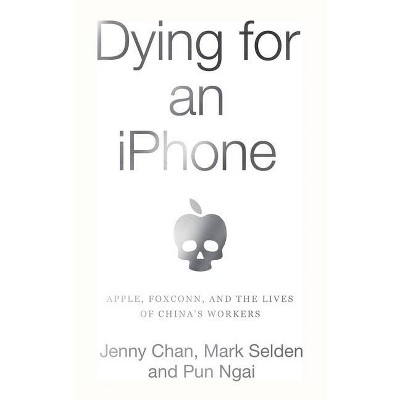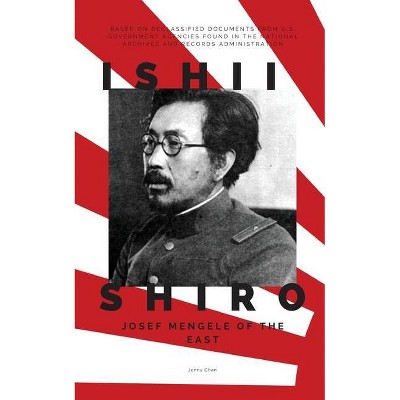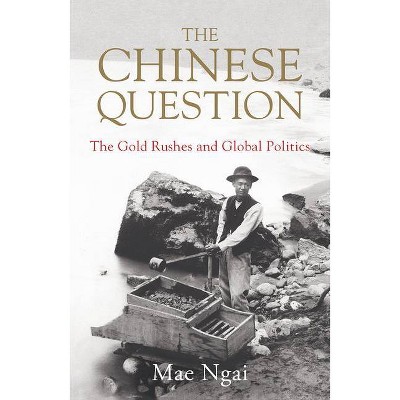Dying for an iPhone - by Jenny Chan & Mark Selden & Ngai Pun (Hardcover)

Similar Products
Products of same category from the store
AllProduct info
<p/><br></br><p><b> About the Book </b></p></br></br><p>A harrowing look lives and struggles of a new generation of Chinese workers confronting the Apple-Foxconn empire and the Chinese state.</p><p/><br></br><p><b> Book Synopsis </b></p></br></br><p>Suicides, excessive overtime, and hostility and violence on the factory floor in China. Drawing on vivid testimonies from rural migrant workers, student interns, managers and trade union staff, <em>Dying for an iPhone</em> is a devastating expose of two of the world's most powerful companies: Foxconn and Apple.<br /><br />As the leading manufacturer of iPhones, iPads, and Kindles, and employing one million workers in China alone, Taiwanese-invested Foxconn's drive to dominate global electronics manufacturing has aligned perfectly with China's goal of becoming the world leader in technology. This book reveals the human cost of that ambition and what our demands for the newest and best technology means for workers.<br /><br />Foxconn workers have repeatedly demonstrated their power to strike at key nodes of transnational production, challenge management and the Chinese state, and confront global tech behemoths. <em>Dying for an iPhone</em> allows us to assess the impact of global capitalism's deepening crisis on workers.' </p><p/><br></br><p><b> Review Quotes </b></p></br></br><br><p>"Sociologists Jenny Chan, Mark Selden and Pun Ngai . . . offer both a business school analysis of the Apple/Foxconn symbiosis and a heart-rending story of the lived experience of the young men and women brutalized by life at the bottom of this enormous transpacific supply chain." <strong>--<em>New Labor Forum</em></strong></p><p><strong><em><br></em></strong></p>"<em>Dying for an iPhone</em> is an excellent book and fills an important gap in the literature. It would make a great gift this year, especially for someone who is expecting a new iPhone." <strong>--<em>New Politics <p/></em></strong>"Dying for an iPhone is rigorously researched, the culmination of the authors' near decade-long project.... The authors conducted interviews with workers, managers, officials, labour rights activists and others, and supported and cross-referenced the information they gleaned from these meetings with innumerable other documents.... The book is a brilliant addition to labour studies, and evidence of how good academic writing can be. It should be read by all." <strong>--<em>British Journal of Industrial Relations</em></strong></p><br><p>"With the potential relocation of factories, terrible working conditions and workers' struggles against them will only be replicated elsewhere. I echo the authors' call for "transnational activism in opposition to the oppression of labor wherever it is found." <strong>--Elaine Lu, </strong><strong><em>Labor Notes <p/></em></strong>"Putting aside the title's glib pun -- a reference to the suicides of some factory workers in China who make Apple products -- this book is a thorough overview of an important topic. Despite best efforts to "decouple" tech supply chains between US firms and Chinese factories, our iPhones and other gadgets are still largely made in China, and we have a responsibility to know their human and environmental, as well as pecuniary, price. This exposé -- dramatically written, but chock full of statistics -- chronicles the deaths, unpaid overtime, and other abuses of factories, with a special focus on Apple partner Foxconn. Drawing on interviews with both workers and managers, it will make you look twice at your phone." --<strong>Alec Ash, </strong><strong><em>The Wire China <p/></em></strong>"<em>Dying for an iPhone</em> powerfully shows that international attention and consumer awareness are not enough momentum for systemic change. The solution lies in empowering workers themselves to participate at the factory level. Indeed, international solidarity is more important than ever to support workers in finding representation to hold responsible parties accountable." <strong>--Geoffrey Crothall, China Labour Bulletin <p/></strong>"While the book tells the story of the strategic exploitation of a million-strong workforce, at its heart are the individual struggles of the workers themselves, conveyed in their lyrics, poetry and statements. 'Each screw turns diligently / but they can't turn around our future, ' writes one. Apple's CEO, Tim Cook, has said that his mission, and that of the company, is 'to serve humanity'; <em>Dying for an iPhone</em> calls into question that aim and the ethics of our globalized economy as a whole." <strong>--Emily Kenway, <em>The Times Literary Supplement</em> <p/></strong>"<em>Dying for an iPhone</em> is deeply researched, comprehensively annotated and fuelled by anger." <strong>--Mike Cormack, <em>South China Morning Post <p/></em></strong>"Dying for an iPhone, by sociologists Jenny Chan, Mark Selden and Pun Ngai, tackles head-on the unsavoury practices associated in the Chinese factories that produce Apple's bestselling product."<strong> --Oliver Farry, <em> The Irish Times <p/></em></strong>"<em>Dying for an iPhone</em> balances heartbreaking worker interviews with carefully compiled employment and financial data from Apple and Foxconn to present a compelling case against the tech giant and its suppliers." <strong>--Jenny, Hamilton, <em>Booklist <p/></em></strong>"A damning indictment of Apple's labor and supply practices....Chan, Selden, and Ngai persuasively argue that the relationship between Apple and shadowy Chinese manufacturing giant Foxconn epitomizes the brutality of globalized late-stage capitalism....The authors merge deep dives into data with chilling testimonials from workers, including some who attempted suicide....[The authors] harness disturbing and varied evidence, including anecdotes, corporate communications, and first-person accounts, creating a compelling exposé of what lies behind one of the most recognizable icons of consumerism....A valuable contribution to an overdue discussion about technology and privilege." <strong>--<em>Kirkus <p/></em></strong><em>"Dying for an iPhone</em> is far and away the most comprehensive account of the lives and working conditions of the people who produce what is perhaps <em>the</em> iconic commodity of the 21<sup>st</sup> century--the iPhone. But it is much more than that. We also see how Apple and Foxconn, working within a neoliberal trade regime promoted by the US, Taiwanese, and Chinese governments alike, transcended national boundaries to develop a brutally exploitative system of labor discipline. It is an incisive account of the social dislocation, but also the resistance, wrought when capitalists of many nations unite against workers. Global in outlook while still presenting fine-grained and highly engaging accounts of workers' lived experiences, this book is a shining example of public scholarship." <strong>--Eli Friedman, co-editor of China on Strike <p/></strong>"Critical, accessible, and rigorously researched, this book offers the most comprehensive analysis of Foxconn, the world's largest electronics factory: its bleak landscape, dire consequences, and inspiring efforts to change it for the better."<strong> --Jack Linchuan Qiu, author of <em>Goodbye iSlave: A Manifesto for Digital Abolition <p/></em></strong>"When reading chapters describing the assembly line experience of workers, and the scientific management system, I could only compare it to the chapter in Marx's Capital, when we are taken into the hidden abode of production. Dying for an iPhone is truly a great achievement to present such incisive description and analysis in a highly readable and accessible form."<strong><em> --</em>Jeffery Hermanson, International Union Educational League<em><br></em></strong></p><br><p>"Holding a sleek new iPhone in our hands it is difficult to imagine the brutal work lives of the people who assemble our smartphones. In <em>Dying for an iPhone</em> Jenny Chan, Mark Selden, and Pun Ngai make this reality visible. Drawing on in-depth field work and a deep knowledge of the global electronics industry, the authors demonstrate not only the steep human cost of our love affair with smartphones, but also the fierce struggles by Chinese workers to improve their working conditions." <strong>--Nicole Aschoff, author of <em>The Smartphone Society: Technology, Power, and Resistance in the New Gilded Age <p/></em></strong></p><br><p>"<em>Dying for an iPhone </em>takes readers deep inside the dark Satanic mills of Foxconn's industrial empire. Drawing on the words of the workers themselves, the book offers an invaluable portrait of the Chinese working class as it pumps blood (sometimes literally) into the productive heart of world capitalism."<strong> --Ben Tarnoff, co-founder of <em>Logic Magazine</em></strong></p><br><p>"A deep dive into exploitation and labour struggle in the world of high-tech electronics manufacturing in China during the past decade. Dying for an iPhone is an expose of the human suffering behind the brands. Everyone should read this."<em> <strong>--Hsiao-Hung Pai, Taiwanese journalist <p/></strong></em>"Dying for an iPhone is an absolutely necessary read for anyone seeking to understand the realities of modern-day capitalism. Contrary to the mythology of Silicon Valley, this carefully researched book explains why companies like Apple owe their success more to exploitation than to innovation." <strong>--Wendy Liu, author of</strong><em><strong> Abolish Silicon Valley: How to Liberate Technology from Capitalism <p/></strong></em>"A sobering investigation into the human, social and environmental costs of producing the devices we have come to rely on, a process in which both corporations and we, the consumers, are complicit." <strong>--Nick Holdstock, author of <em>Chasing the Chinese Dream</em></strong></p><p><strong><em><br></em></strong></p><p>"<i>Dying for an iPhone</i> thus is an outstanding work of critical public sociology that attempts, in the authors' own words, "to inform and heighten social consciousness concerning labour issues to inspire transnational activism in opposition to the oppression of labour wherever it is found" (p. 201). It is not only a must-read for scholars and students in the fields of contemporary China and labour studies, but also strongly recommended to anyone interested in the transformation of global production networks and the future of transnational working-class politics." --Daniel Fuchs, <i>The China Quarterly</i><strong><em><br></em></strong></p><br>
Price History
Cheapest price in the interval: 45.49 on November 8, 2021
Most expensive price in the interval: 45.49 on December 20, 2021
Price Archive shows prices from various stores, lets you see history and find the cheapest. There is no actual sale on the website. For all support, inquiry and suggestion messagescommunication@pricearchive.us



















